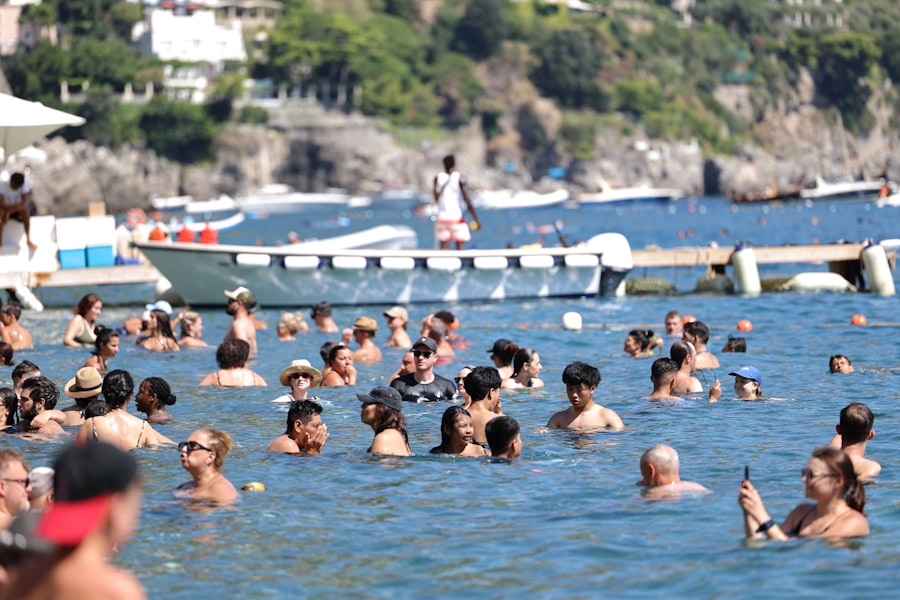As you traverse the sun-drenched landscapes of Europe, from the sunlit beaches of the Mediterranean to the vibrant streets of Paris, the importance of sunscreen cannot be overstated. The European climate varies significantly, with some regions experiencing intense sun exposure, particularly during the summer months. This makes it essential for you to protect your skin from harmful ultraviolet (UV) rays that can lead to sunburn, premature aging, and even skin cancer.
In fact, studies have shown that regular use of sunscreen can significantly reduce the risk of developing skin cancer, making it a crucial part of your daily skincare routine. Moreover, the cultural attitudes towards sun exposure in Europe have evolved over the years. While sunbathing was once seen as a sign of health and beauty, there is now a growing awareness of the risks associated with excessive sun exposure.
You may notice that many Europeans are increasingly prioritizing skin health, opting for sunscreens that not only protect against UV rays but also nourish and rejuvenate the skin. This shift in mindset highlights the importance of incorporating sunscreen into your daily regimen, regardless of the season or your planned activities.
Key Takeaways
- Sunscreen is important in Europe to protect against harmful UV rays and reduce the risk of skin cancer and premature aging.
- Key ingredients in European sunscreens include titanium dioxide, zinc oxide, avobenzone, and octocrylene.
- European sunscreens provide broad spectrum protection against both UVA and UVB rays to prevent sunburn and skin damage.
- Antioxidants in European sunscreens help neutralize free radicals and protect the skin from environmental damage.
- Chemical sunscreens in Europe absorb UV rays, while physical sunscreens create a barrier to reflect and scatter UV rays.
Key Ingredients in European Sunscreens
When selecting a sunscreen in Europe, it’s essential to familiarize yourself with the key ingredients that contribute to its effectiveness. Many European sunscreens contain a blend of chemical and physical filters designed to provide optimal protection against UV radiation. Chemical filters, such as avobenzone and octocrylene, absorb UV rays and convert them into heat, which is then released from the skin.
On the other hand, physical filters like zinc oxide and titanium dioxide sit on the skin’s surface and reflect UV rays away from the body. In addition to these primary ingredients, you may also find that many European sunscreens are enriched with beneficial compounds such as vitamins C and E, which can enhance your skin’s overall health. These antioxidants help combat free radicals generated by UV exposure, providing an extra layer of protection against skin damage.
By understanding these key ingredients, you can make informed choices about which sunscreen will best suit your needs and lifestyle.
Broad Spectrum Protection in European Sunscreens

Broad spectrum protection is a term you will often encounter when shopping for sunscreens in Europe. This designation indicates that a product protects against both UVA and UVB rays, which is crucial for comprehensive skin protection. UVA rays penetrate deep into the skin and are primarily responsible for photoaging and skin cancer, while UVB rays are responsible for causing sunburn.
By choosing a broad spectrum sunscreen, you ensure that your skin is shielded from both types of harmful radiation. In Europe, regulatory standards require that sunscreens labeled as “broad spectrum” must meet specific criteria to ensure their effectiveness. This means that when you select a broad spectrum sunscreen, you can trust that it has undergone rigorous testing to confirm its protective capabilities.
As you enjoy outdoor activities or simply bask in the sun, knowing that your sunscreen offers broad spectrum protection allows you to relax and enjoy your time without worrying about potential skin damage.
The Role of Antioxidants in European Sunscreens
| Country | Number of Sunscreens with Antioxidants | Most Common Antioxidants Used |
|---|---|---|
| France | 120 | Vitamin E, Vitamin C |
| Spain | 90 | Green Tea Extract, Resveratrol |
| Italy | 110 | Coenzyme Q10, Grape Seed Extract |
| Germany | 100 | Alpha Lipoic Acid, Lycopene |
Antioxidants play a vital role in enhancing the efficacy of sunscreens, and many European formulations are designed with this in mind. When you apply sunscreen containing antioxidants, you are not only protecting your skin from UV damage but also combating oxidative stress caused by environmental factors such as pollution and blue light exposure. Ingredients like green tea extract, niacinamide, and coenzyme Q10 are commonly found in European sunscreens and work synergistically with UV filters to provide comprehensive protection.
Incorporating antioxidants into your sunscreen routine can also help improve your skin’s overall appearance. These powerful compounds can reduce inflammation, promote collagen production, and even out skin tone. By choosing a sunscreen rich in antioxidants, you are investing in both immediate protection and long-term skin health.
This dual action makes antioxidants an essential component of any effective sunscreen formulation.
The Difference Between Chemical and Physical Sunscreens in Europe
As you explore the world of European sunscreens, you’ll encounter two primary categories: chemical and physical (or mineral) sunscreens. Understanding the differences between these two types is crucial for selecting the right product for your skin type and lifestyle. Chemical sunscreens typically contain organic compounds that absorb UV radiation and convert it into heat, which is then released from the skin.
They tend to have a lightweight texture and are often preferred for daily wear due to their ease of application. Conversely, physical sunscreens contain mineral ingredients like zinc oxide or titanium dioxide that act as a physical barrier against UV rays. These formulations sit on top of the skin and reflect UV radiation away from the body.
While physical sunscreens may leave a white cast on darker skin tones, they are often recommended for sensitive skin types due to their gentle nature. By understanding these differences, you can make an informed decision about which type of sunscreen aligns best with your preferences and needs.
European Sunscreens and Environmental Impact

In recent years, there has been a growing concern about the environmental impact of sunscreens, particularly regarding coral reefs and marine ecosystems. Many European countries have taken significant steps to address this issue by promoting reef-safe formulations that do not contain harmful chemicals like oxybenzone and octinoxate. As a conscious consumer, you may want to look for sunscreens labeled as “reef-friendly” or “ocean-safe,” which typically use mineral filters instead of chemical ones.
Additionally, some European brands are committed to sustainable practices by using eco-friendly packaging and sourcing ingredients responsibly. By choosing these environmentally conscious products, you can enjoy sun protection while minimizing your ecological footprint. This alignment with sustainability not only benefits the planet but also enhances your overall skincare experience by supporting brands that prioritize ethical practices.
European Sunscreens and Skin Health
Your skin’s health is paramount, and using a quality sunscreen is one of the most effective ways to maintain it. In Europe, many sunscreens are formulated with additional skincare benefits beyond UV protection. Ingredients such as hyaluronic acid provide hydration, while peptides promote skin elasticity and firmness.
By selecting a sunscreen that caters to your specific skin concerns—whether it’s dryness, sensitivity, or signs of aging—you can enhance your skincare routine while ensuring adequate sun protection. Moreover, regular use of sunscreen can help prevent various skin issues such as hyperpigmentation, uneven texture, and premature aging. By incorporating sunscreen into your daily regimen, you are taking proactive steps toward maintaining healthy skin for years to come.
This commitment to skincare not only protects you from immediate damage but also contributes to long-term skin vitality.
European Sunscreens and Anti-Aging Benefits
As you age, protecting your skin from UV damage becomes increasingly important in maintaining a youthful appearance. Many European sunscreens are formulated with anti-aging benefits in mind, incorporating ingredients that target fine lines, wrinkles, and loss of elasticity. For instance, sunscreens enriched with retinol or peptides can help stimulate collagen production while providing essential sun protection.
By using an anti-aging sunscreen daily, you can effectively combat the visible signs of aging while safeguarding your skin from harmful UV rays. This dual approach allows you to enjoy the sun without compromising your skin’s health or appearance. As you navigate through various options available in Europe, look for products that specifically highlight their anti-aging properties to maximize your skincare benefits.
The Regulatory Standards for Sunscreens in Europe
In Europe, sunscreen regulations are among the strictest in the world, ensuring that products meet high safety and efficacy standards before they reach consumers like you. The European Commission has established guidelines that require rigorous testing for both safety and effectiveness of sunscreen products. This means that when you purchase a sunscreen in Europe, you can trust that it has undergone thorough evaluation to ensure it provides adequate protection against UV radiation.
Additionally, labeling requirements mandate clear information about SPF levels and broad-spectrum protection status. This transparency allows you to make informed choices about which products best suit your needs. By understanding these regulatory standards, you can feel confident in your sunscreen selection process and prioritize products that adhere to these stringent guidelines.
The Best European Sunscreens for Different Skin Types
Finding the right sunscreen for your specific skin type is essential for achieving optimal results. If you have oily or acne-prone skin, look for lightweight gel-based formulas that offer oil-free hydration without clogging pores. Brands like La Roche-Posay or Bioderma offer excellent options tailored for oily skin types.
For those with dry or sensitive skin, consider cream-based sunscreens enriched with moisturizing ingredients like shea butter or glycerin. These formulations not only provide sun protection but also nourish and hydrate your skin throughout the day. Brands such as Eucerin or Avene are known for their gentle yet effective formulations suitable for sensitive skin types.
If you’re looking for anti-aging benefits alongside sun protection, opt for sunscreens containing antioxidants or peptides that target fine lines and wrinkles while shielding your skin from UV damage.
Tips for Using European Sunscreens Effectively
To maximize the effectiveness of your sunscreen routine in Europe, there are several tips you should keep in mind. First and foremost, apply sunscreen generously at least 15 minutes before sun exposure to allow it to absorb properly into your skin. Don’t forget areas often overlooked such as your ears, neck, and the tops of your feet.
Reapplication is crucial; make sure to reapply every two hours or immediately after swimming or sweating to maintain optimal protection levels throughout the day. If you’re using makeup, consider investing in a setting spray or powder with SPF for easy reapplication without disrupting your makeup look. Lastly, remember that sunscreen should be part of a comprehensive sun protection strategy that includes seeking shade during peak hours (usually between 10 AM and 4 PM), wearing protective clothing, and donning sunglasses with UV protection.
By following these tips alongside using quality European sunscreens tailored to your needs, you’ll be well-equipped to enjoy the sun safely while keeping your skin healthy and radiant.
European sunscreens are often considered superior due to their stringent regulations and advanced formulations that provide better protection against harmful UV rays. For a deeper understanding of this topic, you can read more in the article found here:
